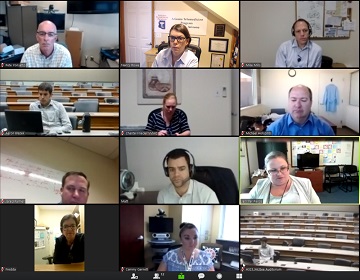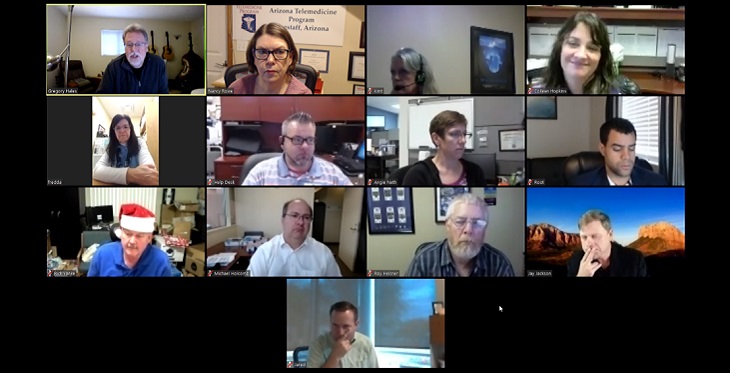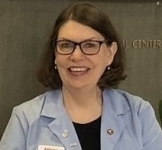“Does anyone know of a USB microphone that can be daisy-chained?” “We held a camera ‘bake-off’ to see which ones perform best.” “We’re having trouble with inbound video calls coming through the firewall.” “How do you manage secure sign-ons for a conference room laptop?” “Does anyone have ideas for power-supply and cord management of a telehealth tablet at a remote site?”
These are the kinds of telehealth-related questions and issues that can take up hours of a technical person’s time when they’re doing all the research themselves. And often, IT people in a health-care setting are wearing a number of hats and can’t devote all their attention to telehealth issues and questions.
That’s why the members of the Northern Arizona Telemedicine Alliance (NATA) decided to hold monthly “Tech Talks” to share information and work together.
NATA is a collaborative group set up by the Arizona Telemedicine Program (ATP) to facilitate communication among northern Arizona telemedicine programs. The ATP is charged with encouraging and promoting the use of telehealth across the state, and NATA is a natural extension. NATA, now comprising 20 telemedicine programs, meets quarterly to discuss collaboration opportunities, legislative updates, educational events and other telehealth-related issues. The technically oriented folks in attendance realized they had a lot of detailed technical questions, issues, and solutions that they wanted to explore in depth—and that’s when the Tech Talks were born.
Nancy Rowe, ATP associate director for outreach, hosts the monthly Tech Talks, which are an hour long and extremely informal. There’s no agenda: people come with new discoveries, workarounds, questions, equipment for sale, tips, and requests for information. Occasionally, people give video tours of their teleconference rooms and equipment. Sometimes the talks get so involved that they run well over the hour that’s allocated.
“The Tech Talks give me a chance to visit with other technical professionals who are facing the same issues and challenges I am. Their experiences and solutions have helped me to explore new possibilities and alternatives,” says Jared Palmer, director of training for Child & Family Support Services, which has clinics in multiple northern Arizona locations. “Through this network, I've found ways to achieve my desired outcomes much more quickly and effectively than if I was left searching Google or online forums. The others have been willing to troubleshoot with me, allowing me to adjust settings and equipment as we visit on the calls.”
“The tech talks give us a place to talk about projects we are doing and what problems we are having,” says Jennifer Pierce, telemedicine manager at Health Choice Integrated Care, headquartered  in Flagstaff. “One of the great things is that we can throw out ideas to people that know about our business. The group is small enough that everyone can participate and put their two cents in. If someone is working on a project and needs a piece of equipment, they can get immediate ideas of what will work. When someone gets new equipment we can be in on testing it.”
in Flagstaff. “One of the great things is that we can throw out ideas to people that know about our business. The group is small enough that everyone can participate and put their two cents in. If someone is working on a project and needs a piece of equipment, they can get immediate ideas of what will work. When someone gets new equipment we can be in on testing it.”
Since almost all of the programs involved are using, or considering, Zoom for videoconferencing or clinical applications, Greg Hales, telehealth director at Tuba City Regional Health Care Corporation, invited a Zoom engineer and sales manager to attend one of the Tech Talks for a Q&A. That turned out to be so popular that Zoom now attends Tech Talks once a quarter to provide updates, answer questions, and help with troubleshooting.
The beautiful thing about the Tech Talks is that telehealth technical support people across a large geographic region are getting to know each other and feel comfortable about sharing their questions, challenges, and information. People are helping each other and collaborating.
“I appreciate the sense of community these Tech Talks provide us as IT administrators and users,” says Jared Palmer.
Jennifer Pierce echoes that sentiment: “It’s nice to get ‘face time’ with people that I have worked with for years but rarely get to see.”
The best evidence, though, that the Tech Talks are helpful is that they’ve been going on for over a year and a half now, and people keep coming back.
NATA is open to any northern Arizona organization with a telemedicine program; there is no membership fee. Contact Nancy Rowe if you would like to join.

